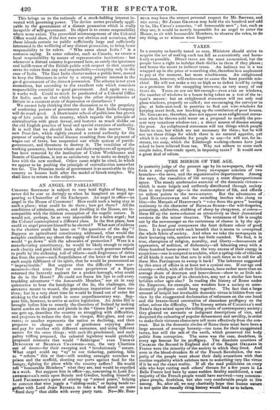AN ANGEL IN PARLIAMENT.
COLONEL SIDTHORP is subject to very bold flights of fancy, but never did he soar so daringly as when be imagined an angel ap- pearing as Chancellor of the Exchequer. An angel in office—an angel in the House of Commons! How could such a being stay in such a place ; what could he do there ; how get there ? All the conditions of admission, action, and dwelling in the House, are in- compatible with the faintest conception of the angelic nature. It would not, perhaps, be so very impossible for a fallen angel; but the Colonel contemplated a different class. In the first place, how could an angel procure himself to be elected ? What sort of address to the electors could he issue on " the questions of the day " ? Suppose an agricultural constituency addressed, what would the seraphic candidate say about the supply of food for the people that would " go down " with the advocates of protection ? Were it a manufacturing constituency, he would be likely enough to enjoin such charity and good faith among all men—such generous refusal to profit by the sickening toil of others—such forgiveness of debts due from the poor—such forgetfulness of the letter of the law and such ample fulfilment of its spirit, that he would be pronounced an " impracticable." But suppose that the difficulty were sur- mounted—that some Peer or some proprietress of a Ripon returned the heavenly aspirant for a pocket-borough, what could he do in the House? He could not frame his lips to call every truckling adventurer " the honourable Member," nor sit in easy quiescence to hear the bandyings of the lie, the challenges, the sarcasms meant to wound, the gratuitous imputation of base mo- tives; but in a very short time he would be found out of order for sticking to the naked truth in some unparliamentary way. Sup- pose him, however, to arrive at active legislation. An Arms Bill is brought before him to remedy the disorders of Ireland by making burnt marks on the guns and pistols in the " Green Isle" ; or some one gets up, describes the country as struggling with difficulties, and proposes to reduce the duty on vinegar, flint-glass, and cur- rants; or another represents the nation as declining, and then proposes to change one set of gentlemen enjoying place and pay for another with different surnames, and using different names for the same things : with such ills proclaimed, and such paltry trifling proposed, the celestial legislator would probably propound measures that would " flabbergast " even THOMAS DUNCOMBE or SHARMAN CRAWFORD—nay, the very Chartists out of doors—for their sweeping and " revolutionary " nature. What angel could say "ay" to our tinkering, paltering, bills to " reform " this or that—still sending untaught wretches to prison and the scaffold, shutting our ports against food for the hungry, fighting for place while the country suffers? He would tell "honourable Members" what they are, and would be expelled in a week. But suppose him in office—ay, concurring in Lord EL- rzstnostountes raids upon Scinde and Gwalior, lending himself to Lord PALMERSTON'S game of stirring up "armed peace," helping to concoct that wise juggle a "sliding-scale," or laying heads to- gether with Lord Jona Rossini, to take a final stand on some "fixed duty " that shifts with every party turn. No-731r. ROE- DUCK may have the utmost personal respect for Mr. SMYTHE, and vice versa ; Sir JAMES GRAHAM may hold the six hundred and odd to be, like Csesar's assassins, " all honourable men" ; but, such as they are, it would be merely impossible fur an angel to enter the House, to sit with honourable Members, to observe the rules, to do any thing, or to witness what happens.


























 Previous page
Previous page